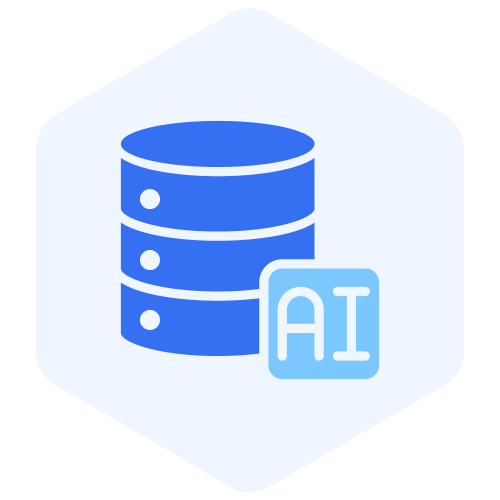AI Database

AI Database
Introduction to AI Databases
In the ever-evolving landscape of artificial intelligence (AI) and machine learning (ML), AI databases have emerged as indispensable tools. These specialized data management systems are designed to meet the unique demands of AI and ML applications, handling everything from massive datasets to intricate data structures. By efficiently storing, processing, and analyzing data, AI databases enable organizations to unlock the full potential of their data, driving innovation and maintaining a competitive edge.
Definition of AI Databases
An AI database is a specialized data management system tailored to handle the unique requirements of AI and ML applications. Unlike traditional databases, AI databases are optimized for managing large volumes of complex data, including structured, semi-structured, and unstructured data. They offer advanced features such as vector storage, similarity search, and natural language processing, making them ideal for applications that demand rapid data analysis and decision-making. Whether it’s handling high-dimensional vectors or performing complex queries, AI databases are built to tackle the challenges of modern data analysis.
Brief Overview of AI Databases
AI databases have become a cornerstone of contemporary data management, enabling organizations to harness the power of their data like never before. These databases are engineered to handle the complexities of AI and ML workloads, providing high-performance data processing, scalability, and flexibility. With AI databases, organizations can accelerate their data analysis and decision-making processes, fostering innovation and staying ahead in their respective industries. By integrating advanced features and supporting diverse data formats, AI databases ensure that businesses can efficiently manage and analyze their data.
Importance of AI Databases in Data Analysis
In the realm of data analysis, AI databases play a pivotal role. They empower organizations to extract valuable insights from their data by providing advanced features such as vector storage, similarity search, and natural language processing. These capabilities are particularly crucial for analyzing complex and unstructured data, enabling organizations to gain a deeper understanding of their data, identify patterns and trends, and make informed decisions. Moreover, AI databases offer real-time insights and analytics, allowing organizations to respond swiftly to changing market conditions and customer needs. By leveraging the power of AI databases, businesses can enhance their data analysis capabilities and drive strategic decision-
 AI Database
AI Database
What Is an AI Database?
Like a backstage crew in a concert, an AI database silently but effectively tackles the complex demands of data storage and manipulation in artificial intelligence and machine learning. It’s this under-the-radar hero who grapples with massive datasets, convoluted structures, and tricky queries to fuel sophisticated AI operations. AI databases significantly enhance object detection capabilities by efficiently storing and processing large datasets to identify patterns and extract insights.
AI databases are like the engine of AI and ML apps, specifically designed to handle semantic similarity searches. They’re pros at dealing with unstructured data, especially when handling vector embeddings—think number sequences in a mathematical space. The importance of data points in the context of machine learning and AI graph databases cannot be overstated, as data points are stored and managed to enhance model development and evaluation. These embeddings pack up nicely for storage, but they can be heavy on computation. That’s why some databases like Milvus use GPU acceleration—it boosts performance and keeps AI workflows running smoothly.
Key features and characteristics of AI databases encompass:
- Vector Storage: Efficient representation and querying of high-dimensional data, such as embeddings from ML models.
- Scalability: Horizontal scaling to handle the growing volume of data used by your AI applications
- Complex Query Support: Capability to handle complex queries essential for similarity searches, ranking, and pattern recognition
- Real-time Processing: Optimization for real-time or near-real-time processing is crucial for recommendation systems and chatbot applications
- Integration with ML Frameworks: Convert your unstructured data with your preferred ML model and store the vector embeddings in an AI Database
- Flexibility: Designed to handle diverse data types, including structured and unstructured data, with flexibility for evolving search needs
- Parallel Processing: Utilization of parallel processing and distributed computing to address the computational demands of semantic search
Prominent AI databases include specialized databases like Milvus, optimized for vector similarity search in high-dimensional spaces. So, an AI database is a specially designed tool —it stores, fetches, and processes data like a pro in AI tasks.
Vector Storage for Accurate Synthetic Data
This capability is particularly valuable for generating accurate synthetic data, essential for training and testing AI models. Generating synthetic data is crucial for analyzing sensitive or sparse datasets, ensuring effective insights without compromising privacy. Additionally, vector storage enables AI databases to handle complex data types, including unstructured data, and provide real-time insights and analytics. Traditional database systems excel in managing structured, tabular data with predefined schemas, while new AI databases are designed to handle more complex and unstructured data types.
Prominent AI databases include specialized databases like Milvus, optimized for vector similarity search in high-dimensional spaces. So, an AI database is a specially designed tool —it stores, fetches, and processes data like a pro in AI tasks.
Key Features of AI Databases
Vector Storage for Accurate Synthetic Data
One of the standout features of AI databases is vector storage, which allows for the efficient storage and processing of high-dimensional vectors. This capability is particularly valuable for generating accurate synthetic data, essential for training and testing AI models. By storing data as vectors, AI databases can perform similarity searches and retrieve data swiftly, making them ideal for applications that require rapid data analysis and decision-making. Additionally, vector storage enables AI databases to handle complex data types, including unstructured data, and provide real-time insights and analytics. This feature not only enhances the performance of AI applications but also ensures that organizations can generate and utilize synthetic data effectively, driving innovation and improving outcomes.
AI Database Examples
Developers have various database options to serve as their AI Database for storing and retrieving vector embeddings. Here are different categories of databases that developers can use as AI databases:
- Relational Databases: Relational database systems are adept at handling structured data organized in rows and columns (tables) with predefined formats, making them ideal for precise search operations. Some relational databases have incorporated vector search indexes, such as Facebook AI Similarity Search (FAISS), IVFFLAT, or Hierarchical Navigable Small Worlds (HNSW), to enhance their projects and facilitate straightforward vector searches.
- Vector Databases: Vector Databases are purpose-built to manage vector embeddings. They are well-suited for storing and retrieving unstructured data types, including images, audio, videos, and textual content, using high-dimensional numerical representations known as vector embeddings. There are numerous open-source and SaaS alternatives available in Vector Databases.
- Other Databases: NoSQL and Search Engine databases have recently incorporated basic vector search capabilities, expanding their functionality to handle vector-related tasks.
So, here's the deal: various database types let developers pick what fits best for their project. Whether they need precise searches with structured data, efficient management of vector embeddings, or even using NoSQL and Search Engine databases' newfound knack for vector searches - it's all about choosing the right tool for the job.
AI Database Design
The design of an AI Database for semantic similarity search varies significantly based on the core database chosen. In this context, our focus is on purpose-built vector databases, specifically tailored to handle the intricacies of vector data and perform similarity searches using techniques like the Approximate Nearest Neighbor (ANN) algorithm. These vector databases are crucial in diverse applications, ranging from recommender systems and chatbots to tools for searching similar images, videos, and audio content. With the advent of large language models (LLMs) like ChatGPT, vector databases also prove valuable in addressing LLM hallucinations.
Key features to consider in a vector database include:
- Scalability and Tunability: Because developers are building applications that need the support of a billion + vector embedding, horizontal scaling across multiple nodes is essential for handling hundreds of millions or billions of unstructured data elements. To handle the wide range of use cases that have different latency, qps, and data consistency requirements, it's super crucial for vector databases to have knobs and levers you can use to tweak to match your needs.
- Multi-tenancy and Data Isolation: Supporting multiple users is essential, but creating a new vector database for each user is impractical. Data isolation ensures that actions within one collection are invisible to the rest of the system unless explicitly shared.
- Complete Suite of APIs: A vector database must offer a comprehensive suite of APIs and SDKs for effective communication and administration. For instance, Milvus gives you access to various SDKs like Python, Node, Go, and Java.
- Intuitive User Interface/Administrative Console: An intuitive user interface and administrative console significantly reduce the learning curve associated with VectorDBs.
So, a top-notch AI database should have scalability and tunability, multi-tenant capabilities with data isolation, a full range of APIs, plus an easy-to-use interface and an admin console.
Does Zilliz Offer an AI Database System?
AI Databases for semantic similarity search are essentially vector databases. And Zilliz offers Zilliz Cloud, a fully managed version of Milvus, the open source vector database that enables 10x faster vector retrieval, a feat unparalleled by any other vector database management system.
- Powerful, flexible support for embeddings generated by multiple Machine Learning algorithms
- Lightning-fast queries on any size data set
- Cost-effective storage of vectors
- Zero ops overhead
- Introduction to AI Databases
- What Is an AI Database?
- Vector Storage for Accurate Synthetic Data
- Key Features of AI Databases
- AI Database Examples
- AI Database Design
- Does Zilliz Offer an AI Database System?
Content
Start Free, Scale Easily
Try the fully-managed vector database built for your GenAI applications.
Try Zilliz Cloud for Free